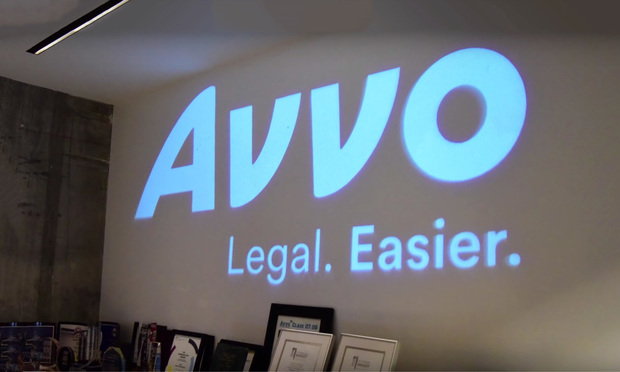Will NJ Supreme Court Take Up Avvo Ethics Case?
An organization representing Avvo and other attorney marketing and referral services, and the institutions intent on keeping a tight leash on such services in New Jersey, are asking the state's highest court to weigh in on the attendant ethics concerns—and putting the significance of the resolution in no uncertain terms.
March 05, 2018 at 09:00 AM
6 minute read
 Avvo headquarters in Seattle.
Avvo headquarters in Seattle. An organization representing Avvo and other attorney marketing and referral services, and the institutions intent on keeping a tight leash on such services in New Jersey, are asking the state's highest court to weigh in on the attendant ethics concerns—and putting the significance of the resolution in no uncertain terms.
Currently before the court is a petition for certification, and filings in opposition, in connection with a June 2017 opinion from three ethics committees that took aim at Avvo, as well as LegalZoom and Rocket Lawyer. The opinion, jointly issued by the Advisory Committee on Professional Ethics, the Committee on Attorney Advertising and the Committee on the Unauthorized Practice of Law, found that Avvo facilitates improper fee-splitting and may not be utilized by New Jersey lawyers, while LegalZoom and Rocket Lawyer operate legal service plans that weren't registered with the judiciary.
The shortcomings of LegalZoom and Rocket Lawyer were more easily fixable—by registering, the committees held. But they found ethical trouble with the very structure of Avvo's programs, which is the main issue on which court review is sought.
“This court has a duty to increase access to justice,” wrote Washington, D.C.-based Consumers for a Responsive Legal System in its petition last Sept. 11. “Innovative business models such as lawyer-client matching services have the potential to narrow the enormous access to justice gap that consumers face. The joint opinion would chill this innovation and others like it, leaving millions of New Jersey residents with fewer ways to find legal help.”
In its papers, the organization, called Responsive Law for short, describes itself as “a national nonprofit organization working to make the civil legal system more affordable, accessible, and accountable to its consumers.”
Responsive Law contends that the ethics committees are not immune to liability because their makeup, “overwhelmingly … of lawyers,” implicates antitrust principles, and the court therefore must engage in de novo review of the issue. It also argues that exceptions to the fee-sharing ban allowing for reasonable advertising costs sanction arrangements where the advertising fee is based on the amount of business generated. And, Responsive Law contends, higher marketing fees for higher-fee legal services are akin to higher transaction fees charged by credit cards, and help services like Avvo compensate for risk.
The New Jersey Attorney General's Office, representing the ethics committees, filed an opposition brief on Feb. 6, calling Responsive Law's points about the impact on the legal marketplace “speculative and overstated,” and the opinion “narrowly drawn” so not to broadly ban all such services.
On the antitrust issue, “even assuming arguendo that prohibiting Avvo from operating in New Jersey might have some 'anti-competitive' effects, federal antitrust laws do not apply,” added Senior Deputy Attorney General Steven N. Flanzman. As for the petitioner's characterization of Avvo's marketing fees as permissible advertising fees, that “ignores the essence of Avvo's relationship with participating attorneys,” Flanzman wrote. “Avvo steers consumers to lawyers participating in Avvo's plans due to Avvo's direct financial interest in maximizing the aggregate amounts of fees collected. Avvo's financial interest exists even if a referral is not in the consumer's best interest.”
The New Jersey State Bar Association, whose inquiry led the ethics committees to examine the issue last year, filed an amicus brief on Feb. 16 opposing the certification petition.
“The joint opinion is clear and straightforward,” wrote NJSBA president Robert Hille. “It requires no further review.”
The committees “rightfully concluded that Avvo is connecting its users to lawyers who have signed up with the company to provide legal services, and the company is impermissibly sharing in the legal fee charged for those services under the guise of 'marketing fees,'” Hill added.
A reply brief from Responsive Law, represented locally by Jeremy Meyer of Cleary, Josem & Trigiani's Red Bank office, is due to the court March 19. The organization's executive director, Tom Gordon, said in an email that “New Jersey makes it so difficult for the public to weigh in on a matter of public policy.”
“In most states, when the Supreme Court acts in a rulemaking capacity, it allows public comment without requiring formal legal briefs,” he said. “In contrast, New Jersey requires that the matter be treated as if it were litigation. We've submitted comments to numerous other state supreme courts on ethics matters, and have never been required to find local counsel or pay filing fees to do so.”
Hille, of McElroy, Deutsch, Mulvaney & Carpenter in Morristown, reached by phone, countered that “the process isn't flawed” because the Supreme Court has constitutional authority over matters implicating the practice of law.
He said services like Avvo's add “a layer of cost” to the attorney-client relationship, and, “I still don't have a good answer to the question” of how doing so improves access to justice. “It presumes the public can't go directly to the lawyer marketplace,” Hille added.
An Attorney General's Office spokesman didn't respond to an emailed invitation to comment on the case beyond the contents of Flanzman's opposition brief.
The June 21 opinion was issued in response to an NJSBA inquiry asking whether lawyers may “participate in certain online, non-lawyer, corporately owned services.” The inquiry named Avvo, LegalZoom and Rocket Lawyer specifically.
The opinion decreed that “New Jersey lawyers may not participate in the Avvo legal service programs because the programs improperly require the lawyer to share a legal fee with a nonlawyer in violation of Rule of Professional Conduct 5.4(a), and pay an impermissible referral fee in violation of Rule of Professional Conduct 7.2(c) and 7.3(d).”
Avvo, LegalZoom and Rocket Lawyer all defended their services in the wake of the opinion.
The committees were most critical of Avvo, whose “pay-for-service plans” business model, they said, violates RPC 5.4(a), which prohibits fee-sharing.
According to the opinion, Avvo offers “Avvo Advisor”—through which customers buy 15-minute phone conversations with a lawyer for a $40 flat rate, of which Avvo keeps a $10 marketing fee—and “Avvo Legal Services,” which allows customers to pay flat fees to Avvo for legal services provided by affiliated lawyers, after which Avvo pays the lawyer but keeps a marketing fee.
“The participating lawyer receives the set price for the legal service provided, then pays a portion of that amount to Avvo,” the committees said. “The label Avvo assigns to this payment (“marketing fee”) does not determine the purpose of the fee. … Here, lawyers pay a portion of the legal fee earned to a nonlawyer; this is impermissible fee sharing.”
The opinion also held that marketing fees lawyers pay to Avvo are not for advertising but amount to an “impermissible referral fee” by the definition contained in RPCs 7.2(c) and 7.3(d), and Avvo's practice of holding the lawyer's fee until the service is provided violates an attorney's requirement to maintain a registered trust account per Rule 1:28(a)-2.
Soon after the June 21 opinion in New Jersey, attorney ethics authorities in New York followed suit.
This content has been archived. It is available through our partners, LexisNexis® and Bloomberg Law.
To view this content, please continue to their sites.
Not a Lexis Subscriber?
Subscribe Now
Not a Bloomberg Law Subscriber?
Subscribe Now
NOT FOR REPRINT
© 2025 ALM Global, LLC, All Rights Reserved. Request academic re-use from www.copyright.com. All other uses, submit a request to [email protected]. For more information visit Asset & Logo Licensing.
You Might Like
View All


On the Move and After Hours: Buchanan; Malamut Law; Genova Burns; Faegre Drinker
3 minute readTrending Stories
- 128 Firms Supporting Retired Barnes & Thornburg Litigator in Georgia Supreme Court Malpractice Case
- 2Boosting Litigation and Employee Benefits Practices, Two Am Law 100 Firms Grow in Pittsburgh
- 3EMT Qualifies as 'Health Care Provider' Under Whistleblower Act, State Appellate Court Rules
- 4Bar Report - Feb. 3
- 5Was $1.3M in 'Incentive' Payments Commission? NJ Justices Weigh Arguments
Who Got The Work
J. Brugh Lower of Gibbons has entered an appearance for industrial equipment supplier Devco Corporation in a pending trademark infringement lawsuit. The suit, accusing the defendant of selling knock-off Graco products, was filed Dec. 18 in New Jersey District Court by Rivkin Radler on behalf of Graco Inc. and Graco Minnesota. The case, assigned to U.S. District Judge Zahid N. Quraishi, is 3:24-cv-11294, Graco Inc. et al v. Devco Corporation.
Who Got The Work
Rebecca Maller-Stein and Kent A. Yalowitz of Arnold & Porter Kaye Scholer have entered their appearances for Hanaco Venture Capital and its executives, Lior Prosor and David Frankel, in a pending securities lawsuit. The action, filed on Dec. 24 in New York Southern District Court by Zell, Aron & Co. on behalf of Goldeneye Advisors, accuses the defendants of negligently and fraudulently managing the plaintiff's $1 million investment. The case, assigned to U.S. District Judge Vernon S. Broderick, is 1:24-cv-09918, Goldeneye Advisors, LLC v. Hanaco Venture Capital, Ltd. et al.
Who Got The Work
Attorneys from A&O Shearman has stepped in as defense counsel for Toronto-Dominion Bank and other defendants in a pending securities class action. The suit, filed Dec. 11 in New York Southern District Court by Bleichmar Fonti & Auld, accuses the defendants of concealing the bank's 'pervasive' deficiencies in regards to its compliance with the Bank Secrecy Act and the quality of its anti-money laundering controls. The case, assigned to U.S. District Judge Arun Subramanian, is 1:24-cv-09445, Gonzalez v. The Toronto-Dominion Bank et al.
Who Got The Work
Crown Castle International, a Pennsylvania company providing shared communications infrastructure, has turned to Luke D. Wolf of Gordon Rees Scully Mansukhani to fend off a pending breach-of-contract lawsuit. The court action, filed Nov. 25 in Michigan Eastern District Court by Hooper Hathaway PC on behalf of The Town Residences LLC, accuses Crown Castle of failing to transfer approximately $30,000 in utility payments from T-Mobile in breach of a roof-top lease and assignment agreement. The case, assigned to U.S. District Judge Susan K. Declercq, is 2:24-cv-13131, The Town Residences LLC v. T-Mobile US, Inc. et al.
Who Got The Work
Wilfred P. Coronato and Daniel M. Schwartz of McCarter & English have stepped in as defense counsel to Electrolux Home Products Inc. in a pending product liability lawsuit. The court action, filed Nov. 26 in New York Eastern District Court by Poulos Lopiccolo PC and Nagel Rice LLP on behalf of David Stern, alleges that the defendant's refrigerators’ drawers and shelving repeatedly break and fall apart within months after purchase. The case, assigned to U.S. District Judge Joan M. Azrack, is 2:24-cv-08204, Stern v. Electrolux Home Products, Inc.
Featured Firms
Law Offices of Gary Martin Hays & Associates, P.C.
(470) 294-1674
Law Offices of Mark E. Salomone
(857) 444-6468
Smith & Hassler
(713) 739-1250







